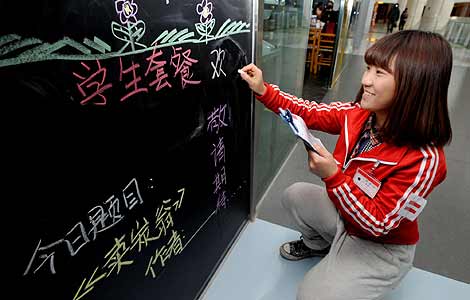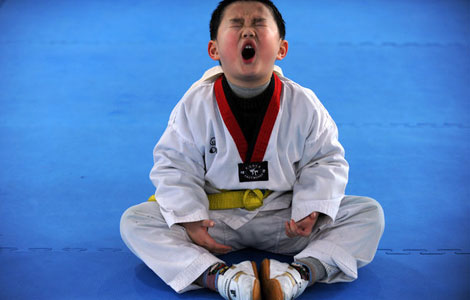Taiwan's Ma wins tight re-election race
Updated: 2012-01-15 07:47
By Xing Zhigang and Tan Zongyang (China Daily)
|
|||||||||
BEIJING / FUZHOU - Incumbent Taiwan leader Ma Ying-jeou won a close re-election bid on Saturday, leveraging his message of greater prosperity through expanded ties with the Chinese mainland to beat his populist-minded opponent.
The elections had been expected to be tight, but the "Central Election Commission" said Ma and his running mate Wu Den-yih had garnered 51.6 percent of total votes, against 45.6 percent for Tsai Ing-wen and her running mate Su Jia-chyuan of the main opposition Democratic Progressive Party (DPP).
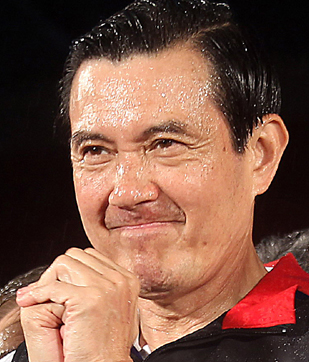 |
|
Taiwan leader Ma Ying-jeou gestures to supporters, Taipei, Jan 14, 2012. [Photo/Agencies] |
A third candidate, James Soong, chairman of the People First Party and once a heavyweight with Ma's ruling Kuomintang (KMT) party, only managed 2.8 percent.
"We won!" Ma, 61, shouted to supporters at party headquarters as they cheered and clapped in the pouring rain.
"In the next four years, cross-Straits relations will be more peaceful, with greater mutual trust and the chance of conflict will be less."
"This is not my personal victory, the victory belongs to all Taiwan people," Ma told thousands of jubilant supporters in downtown Taipei. "They have told us we are on the right track."
The election revolved around Ma's claims that his signature policy of pushing for closer economic ties with the mainland's lucrative markets was good for the island's 23 million people.
During his 3-1/2 years in office, Ma lowered tensions across the 160-kilometer-wide Taiwan Straits to their lowest levels since the two sides split after a civil war in 1949.
Ma had advocated a series of bold commercial initiatives across the Straits.
Tsai's campaign emphasized bread-and-butter issues, and charged that Ma's policies had spawned growing income inequality and soaring urban housing prices that had pushed young middle-class and working-class people out of the market.
She also accused Ma of undermining Taiwan's de facto independence in exchange for economic benefits from the mainland - a claim meant to resonate with her party's pro-independence base.
The 55-year-old Tsai announced her resignation as DPP chairwoman while conceding defeat at her Taipei election headquarters, with some of her supporters crying.
The Taiwan Affairs Office of the State Council in Beijing issued a statement on Saturday night, saying the mainland has noted the election result.
"The facts over the past four years have time and again proved that the peaceful development of cross-Straits relations has been the right road and has won the support of the majority of Taiwan compatriots," the statement said.
It also stressed that the development of bilateral relations should be based on the fight against "Taiwan independence" and the 1992 Consensus, referring to an agreement reached by the two sides in 1992 in Hong Kong, in which each agreed to its own interpretation of the one-China principle.
Ma's victory margin was much reduced from the near 17-point lead he had over the DPP at the last election in 2008.
But the KMT also regained a clear majority in the legislature, which should give Ma a fillip in pushing through policy.
The KMT got 64 seats in the 113-member legislature, although that is also lower than the 81 seats they had in the outgoing house.
"We will continue to let economic growth flourish, protect cross-Strait peace and friendly relations to achieve more concrete results in cooperation in important areas," said Lien Chan, the honorary chairman of the KMT.
But in an acknowledgement of the reduced majority, he added: "We need to discuss thoroughly the criticism the voters have handed to us."
Mainland experts on Taiwan Studies said Ma's policy towards the mainland has helped the island to resist global economic downturns and stabilized the situation in the Taiwan Straits region.
"The years since 2008 have witnessed a golden period for cross-Straits relations, which are likely to continue after Ma's re-election," said Ni Yongjie, an expert at the Shanghai Institute of Taiwan Studies.
While there is little appetite in Taiwan for political union with Beijing, a majority of Taiwan's people want to engage the mainland commercially, because they see it as an economic force whose footprint is constantly growing.
Ma's policies spoke to that perception.
Since taking office, he has sanctioned big upsurges in direct flights across the Straits, given the green light to accelerated mainland tourist visits to Taiwan and opened the door to mainland investment.
His signature achievement has been the completion of a mainland trade deal in June 2010 that lowered tariffs on hundreds of goods.
While most of Taiwan's $124 billion worth of exports to the mainland last year were electronic items such as television displays and cellphone chips, there was also a big surge in agricultural sales from southern Taiwan, long a stronghold of Tsai's party.
The mainland is now Taiwan's largest trading partner, and the trade volume in the first 11 months of 2011 reached $146.5 billion, up 11.2 percent compared to the same period last year.
The mainland also overtook Japan as Taiwan's biggest source of tourists in the same period, with 1.6 million visitors, 69 percent more than a year earlier, according to data from Taiwan's tourism authority.
Ni said the policy towards the mainland has been a major tussle in this year's leadership election debate - and was key to Ma's narrow victory as he has dramatically improved cross-Straits relations over the past four years.
"The voting result once again proved that most people in Taiwan prefer Ma to maintain peace and stability across the region, rather than a troubling political picture due to Tsai's antagonistic mentality," Ni said.
"A closer economic tie with the mainland has helped boost the island's economy in the global recession and brought real benefit to the Taiwan people."
Liu Guoshen, dean of the Taiwan Research Institute at Xiamen University, hailed Ma's re-election as a "positive and affirmative" move of the island's political arena.
"Ma will continue to follow the basic thought of proceeding from economic issues to political ones, from the easy to the difficult," Liu said.
He added that new frameworks for cooperation in educational, culture and non-governmental personal exchanges are likely to be set up in the next four years.
AP and Reuters contributed to this story.
Hot Topics
Kim Jong-il, Mengniu, train crash probe, Vaclav Havel, New Year, coast guard death, Internet security, Mekong River, Strait of Hormuz, economic work conference
Editor's Picks
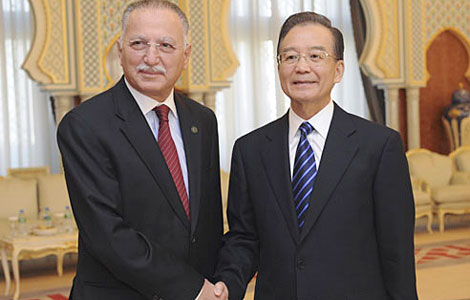
|

|
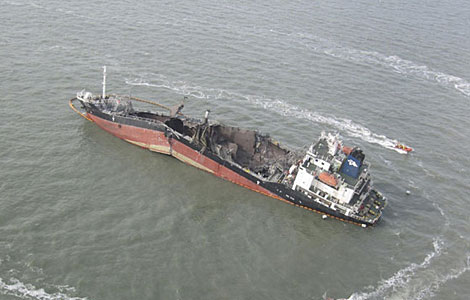
|
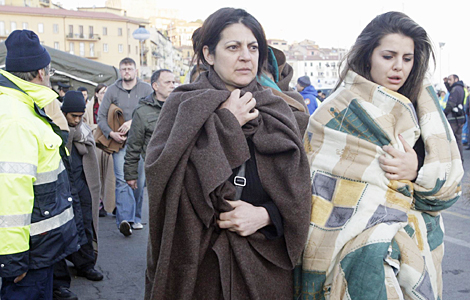
|
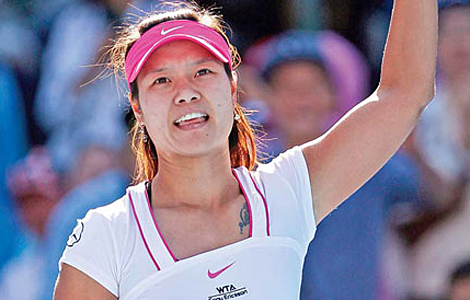
|

|


